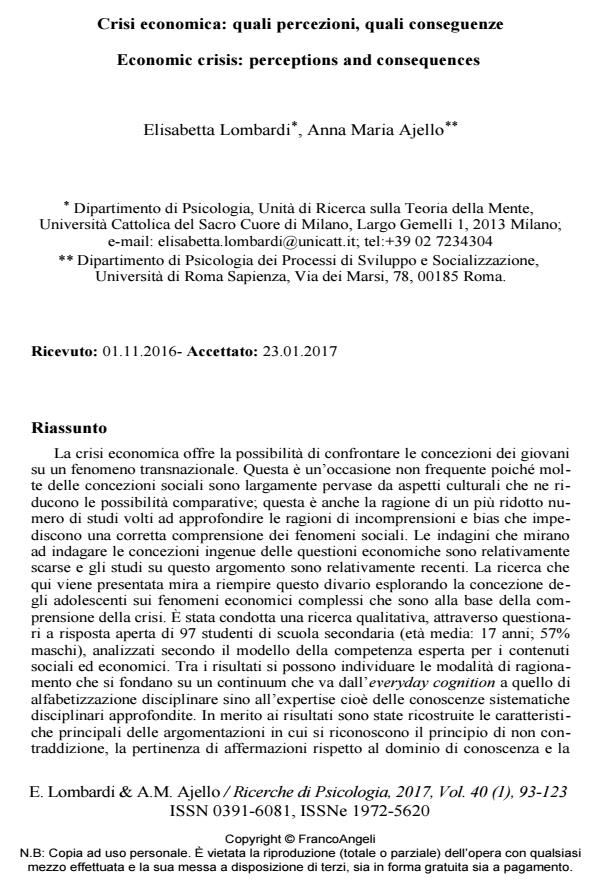Economic crisis: perceptions and consequences
Journal title RICERCHE DI PSICOLOGIA
Author/s Elisabetta Lombardi, Anna Maria Ajello
Publishing Year 2017 Issue 2017/1
Language Italian Pages 31 P. 93-123 File size 298 KB
DOI 10.3280/RIP2017-001005
DOI is like a bar code for intellectual property: to have more infomation
click here
Below, you can see the article first page
If you want to buy this article in PDF format, you can do it, following the instructions to buy download credits

FrancoAngeli is member of Publishers International Linking Association, Inc (PILA), a not-for-profit association which run the CrossRef service enabling links to and from online scholarly content.
The economic crisis offers an opportunity to compare the adolescents’ prior conceptions on a transnational phenomenon. This is not frequent opportunity because many of social conceptions are largely pervaded by cultural aspects that reduce the comparative possibilities; this is also the reason for limited number of studies that investigate the misunderstandings and biases that obstruct a social phenomena’s understanding. The investigations of naïve understandings of economic issues are relatively scarce and the studies’ focus on this topic are relatively recent. The research study to be presented here aims to contribute to filling this gap by exploring adolescents’ naïve understandings of the complex economic phenomena that are underlying the understanding of the crisis. A qualitative research study was conducted through an open question interview with 97 secondary school students (average age: 17 years, 57% male), analyzed according to the model of expertise in knowledge acquisition for social and economic content. Among other results could be find ways of reasoning that are based on an ideal continuum model that goes from everyday cognition to academic/scholastic literacy until expertise that represents a systematic in-depth knowledge. Have been rebuilding the main features of reasoning through non-contradiction principle, the relevance compared to the domain of knowledge and the consistency compared to the content of propositions. The data obtained confirm that the students show serious difficulties to understanding of complex economic phenomena and demonstrate the hard transferability of learned economic knowledge in the understanding of daily economic problems.
Keywords: Economic crisis, secondary school students, economic/financial education, financial literacy, representations.
- Learning to wait and be altruistic: Testing a conversational training in economic education for primary school children Elisabetta Lombardi, Annalisa Valle, Teresa Rinaldi, Davide Massaro, Antonella Marchetti, in Europe’s Journal of Psychology /2021 pp.306
DOI: 10.5964/ejop.2453
Elisabetta Lombardi, Anna Maria Ajello, Crisi economica: quali percezioni, quali conseguenze in "RICERCHE DI PSICOLOGIA " 1/2017, pp 93-123, DOI: 10.3280/RIP2017-001005